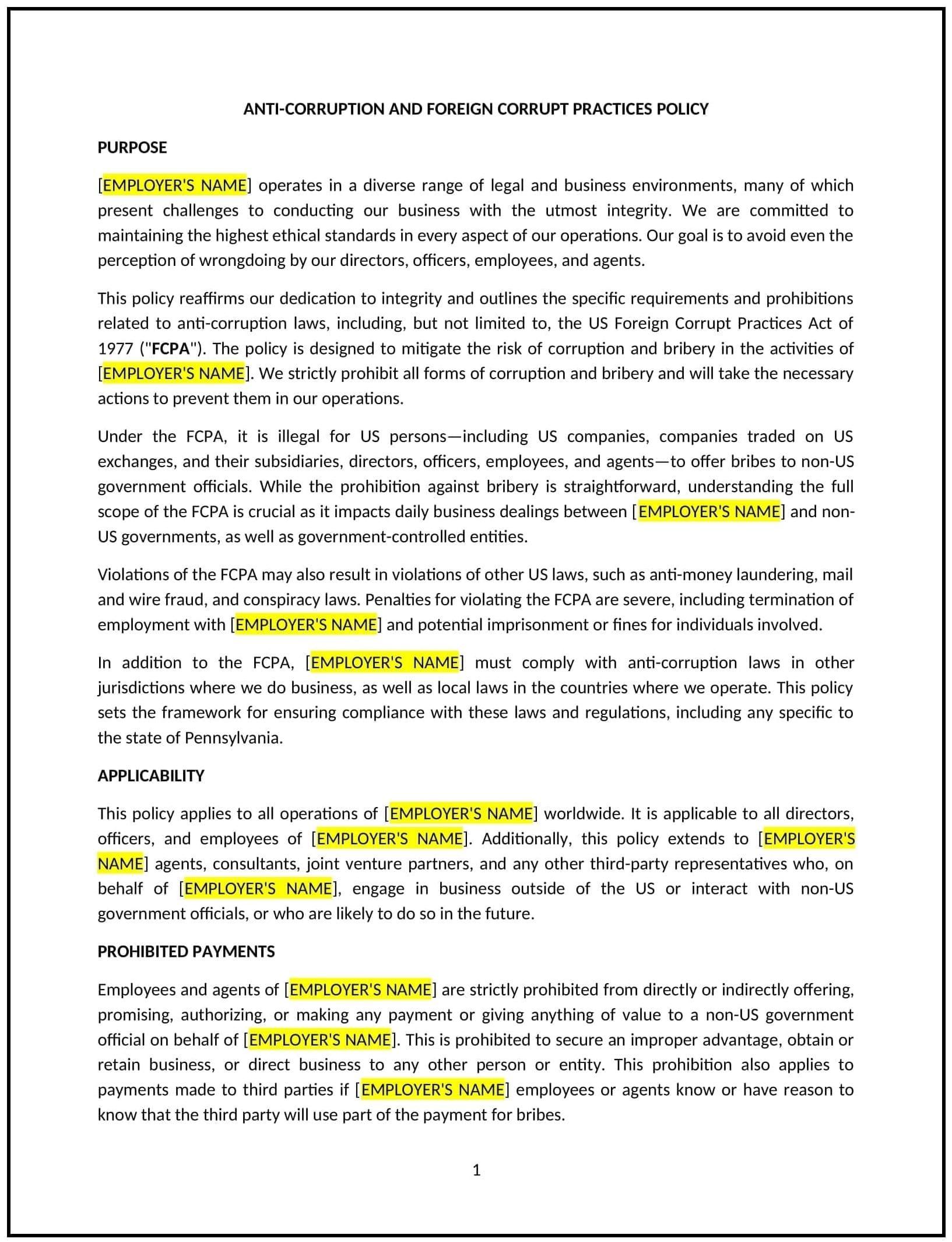Anti-corruption and foreign corrupt practices policy (Pennsylvania): Free template
Got contracts to review? While you're here for policies, let Cobrief make contract review effortless—start your free review now.

Customize this template for free
Anti-corruption and foreign corrupt practices policy (Pennsylvania)
This anti-corruption and foreign corrupt practices policy is designed to help businesses in Pennsylvania establish clear guidelines to prevent bribery, corruption, and unethical practices. Whether operating locally or engaging in international business activities, this template addresses key elements to ensure lawful and ethical operations in compliance with the Foreign Corrupt Practices Act (FCPA) and Pennsylvania regulations.
By using this template, businesses can safeguard their reputation, promote integrity, and mitigate risks associated with corruption while aligning with legal and ethical standards.
How to use this anti-corruption and foreign corrupt practices policy (Pennsylvania)
- Define prohibited activities: Specify actions that violate anti-corruption laws, such as offering or accepting bribes, kickbacks, or improper payments to influence business outcomes.
- Outline employee responsibilities: Clearly state the expectations for employees, managers, and third-party agents in adhering to the organization's anti-corruption standards.
- Establish reporting mechanisms: Provide steps for employees to report suspected violations, such as using anonymous reporting channels or contacting designated compliance officers.
- Detail training requirements: Require regular training on anti-corruption laws, organizational policies, and best practices to promote awareness and accountability.
- Reflect Pennsylvania-specific considerations: Address compliance needs for local industries, such as manufacturing, healthcare, and energy, while aligning with state and federal regulations.
Benefits of using an anti-corruption and foreign corrupt practices policy (Pennsylvania)
A well-implemented anti-corruption policy protects your business. Here's how it helps:
- Promotes ethical conduct: Establishes a culture of integrity by defining and reinforcing standards for ethical behavior.
- Supports compliance: Ensures adherence to the FCPA, Pennsylvania regulations, and international anti-corruption standards, reducing legal risks.
- Protects organizational reputation: Safeguards the business against reputational damage caused by corruption or unethical practices.
- Reduces financial risks: Mitigates the likelihood of fines, penalties, and losses associated with violations of anti-corruption laws.
- Encourages accountability: Clearly defines roles and responsibilities to prevent unethical conduct and support a transparent work environment.
Tips for using an anti-corruption and foreign corrupt practices policy (Pennsylvania)
- Communicate expectations: Share the policy with employees, contractors, and third-party agents to ensure understanding and compliance with anti-corruption standards.
- Train employees: Provide regular training sessions on anti-corruption laws, including the FCPA and Pennsylvania-specific regulations.
- Conduct regular audits: Implement monitoring systems to assess compliance and identify potential risks or violations.
- Encourage reporting: Foster a workplace culture where employees feel safe reporting potential corruption or unethical practices without fear of retaliation.
- Review periodically: Update the policy to reflect changes in Pennsylvania laws, federal regulations, or organizational practices.